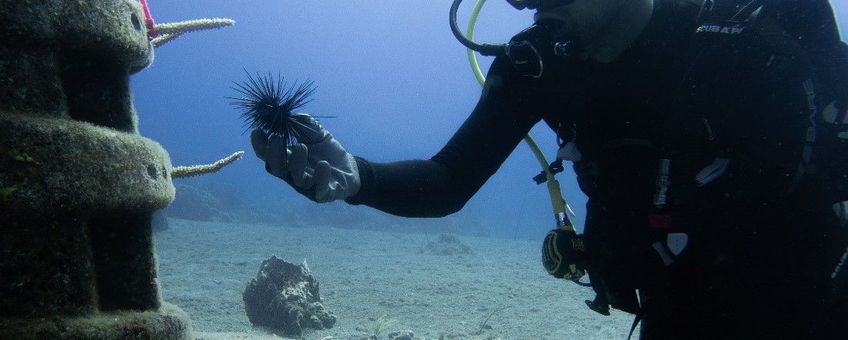
Innovative invertebrate research to save the reefs
Dutch Caribbean Nature Alliance (DCNA)Hylkema outlined cutting-edge strategies, aimed at increasing the resilience of Caribbean coral reefs. These are critical to the ecological and economic health of the region. Hylkema's research underscores the importance of restoring the long-spined sea urchin, Diadema antillarum, a keystone species that plays a vital role in controlling algae growth and promoting coral recruitment. The mass mortality of Diadema in the 1980s led to a significant increase in macroalgae, which has stifled coral growth and reduced reef biodiversity. Even after four decades, Diadema populations did not recover to their former densities, necessitating active restoration efforts to control the proliferating algae
New methods
The strategies discussed during the workshop include collection of Diadema settlers, followed by low-tech grow-out methods and restocking. Alternatively, the innovative approache of assisted natural recovery can help increase Diadema populations by adding settlement substrate to the reef. These methods have shown promise in enhancing Diadema recruitment and survival and are positioned to be implemented on a large scale across the Dutch Caribbean. Hylkema’s work also highlighted the potential for culturing Diadema from gametes (eggs), a high-tech but high-reward strategy that could substantially increase Diadema populations in the long term.

Collaboration
This research is closely linked to other ongoing restoration projects within the Dutch Caribbean, such as the ReefGrazer project (2024-2026). This project is investigating the effects of diverse invertebrate grazers, like the Caribbean King Crab and West Indian Sea Egg on reef ecosystems. By restoring a variety of herbivorous species, the researchers aim to create a more resilient and biodiverse reef system that can better withstand environmental pressures. In addition, Hylkema plans to study restocking herbivores in combination with other reef restoration initiatives such as coral restoration and artificial reef deployment.

Implications
The implications of these restoration efforts are profound. Healthy populations of invertebrate herbivores will not only reduce macroalgae cover, facilitating natural coral recruitment and growth, but will also enhance the survival of coral outplants - key to the success of broader reef restoration initiatives. This integrated approach to restoration, combining invertebrate and coral restoration, could serve as a model for other Caribbean regions facing similar challenges.
More information
- Watch the presentation Restoration of invertebrate herbivores.
- Stay tuned for more articles in this coral reef restoration series, where we will delve deeper into the topics discussed during the workshop, highlighting the critical work being done to preserve these vital marine ecosystems.
- This workshop is funded by the Ministry of Agriculture, Nature and Food Quality (LNV) and supported by the Dutch Postcode Lottery.
Text: Dutch Caribbean Nature Alliance
Images: Alwin Hylkema; Mika de Breuyn
